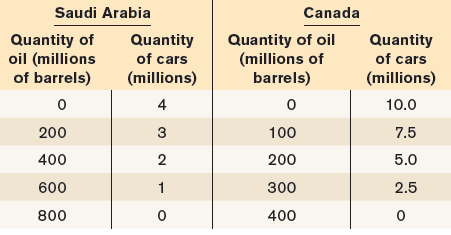Assume Saudi Arabia and Canada face the production possibilities for oil and cars shown in the accompanying
Question:

a. What is the opportunity cost of producing a car in Saudi Arabia? In Canada? What is the opportunity cost of producing a barrel of oil in Saudi Arabia? In Canada?
b. Which country has the comparative advantage in producing oil? In producing cars?
c. Suppose that in autarky, Saudi Arabia produces 200 million barrels of oil and 3 million cars; and suppose that Canada produces 300 million barrels of oil and 2.5 million cars. Without trade, can Saudi Arabia produce more oil and more cars? Without trade, can Canada produce more oil and more cars? Suppose now that each country specializes in the good in which it has the comparative advantage, and the two countries trade. Also assume that for each country the value of imports must equal the value of exports.
d. What is the total quantity of oil produced? What is the total quantity of cars produced?
e. Is it possible for Saudi Arabia to consume 400 million barrels of oil and 5 million cars and for Canada to consume 400 million barrels of oil and 5 million cars?
f. Suppose that, in fact, Saudi Arabia consumes 300 million barrels of oil and 4 million cars and Canada consumes 500 million barrels of oil and 6 million cars. How many barrels of oil does Canada import? How many cars does Canada export? Suppose a car costs $10,000 on the world market. How much, then, does a barrel of oil cost on the world market?
Opportunity CostOpportunity cost is the profit lost when one alternative is selected over another. The Opportunity Cost refers to the expected returns from the second best alternative use of resources that are foregone due to the scarcity of resources such as land,...
Step by Step Answer:

Macroeconomics
ISBN: 978-1319120054
3rd Canadian edition
Authors: Paul Krugman, Robin Wells, Iris Au, Jack Parkinson





